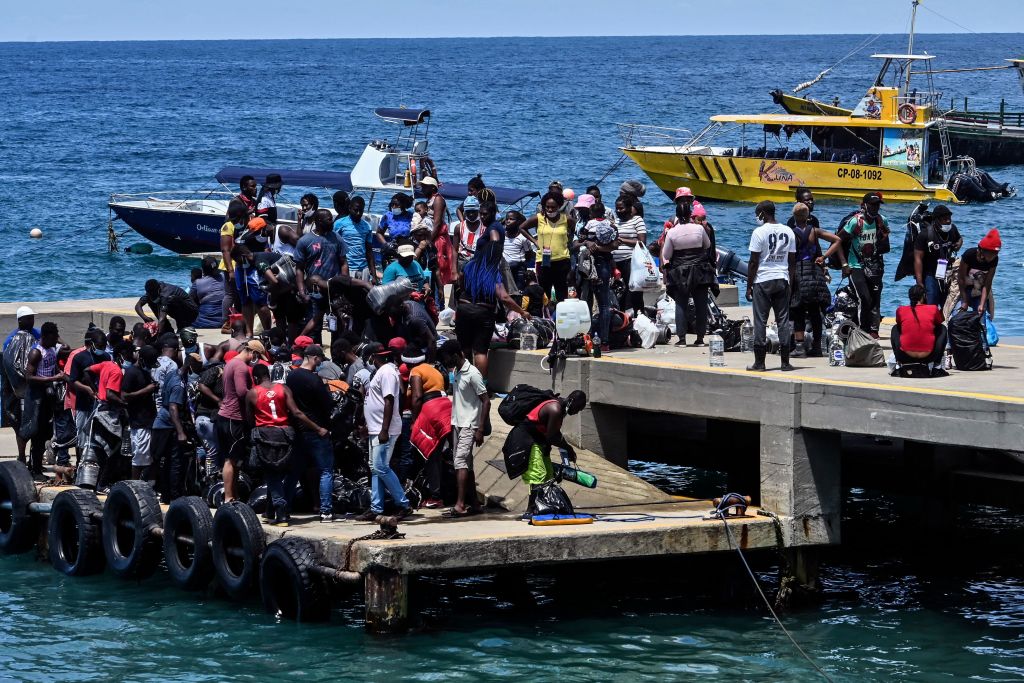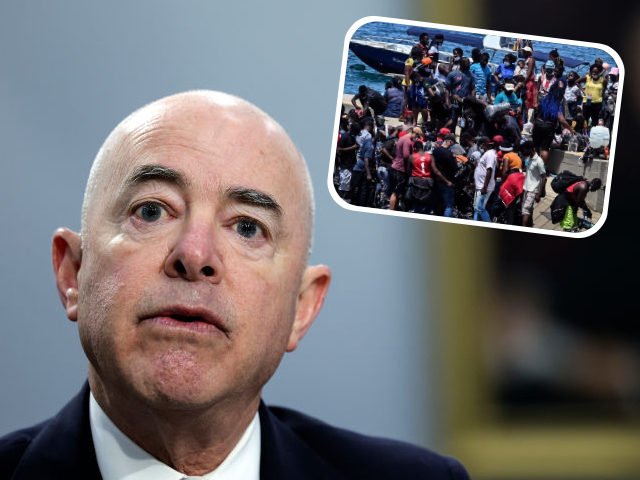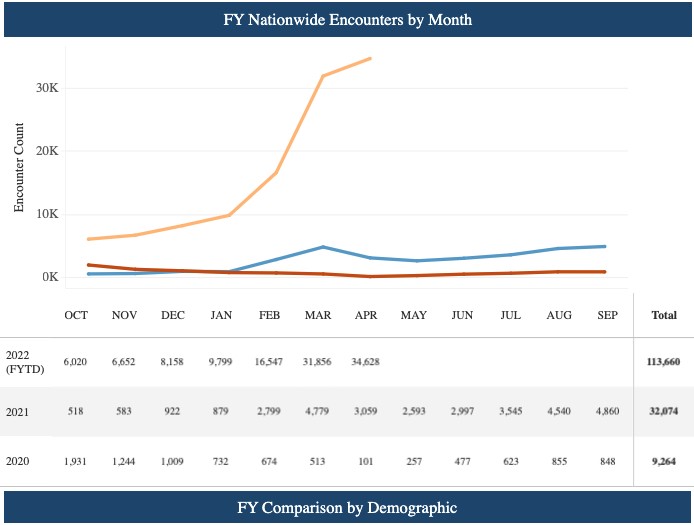President Joe Biden’s border chief has welcomed almost 150,000 poor Cubans into the United States, mostly to seek jobs and housing that would otherwise go to poor Americans.
The inflow is rising rapidly as Department of Homeland Security (DHS) Secretary Alejandro Mayorkas exempts more Cubans from the Title 42 bar against migrants.
The Cuban-born Mayorkas allowed 36,628 Cubans to enter in April, up from 16,547 in February and 8,158 in December. The vast majority of Cubans are working-age adults and are allowed to get work permits by simply asking for asylum — even though they are economic migrants.
The Biden inflow is greater than the 125,000 Cubans who flooded into the United during the 1980 “Mariel Boatlift.”
The inflow is expected to rise after Biden’s deputies agreed to help Cubans in the U.S. to send more money back to their relatives stuck on the island.
The May 16 economic agreement is good news for the Biden administration and Cuba’s dictatorial government.
Cuba’s government will gain wealth from the economic remittances sent home by the exiled Cuban workers and will also export the young men and women who might otherwise stage uprisings against the government. The deal will also allow Cuban to send 20,000 more legal migrants to the United States, most of whom likely will be old to work productively.
The population-transfer deal will benefit U.S. business groups by exporting more migrant consumers and workers into the low-wage U.S. economy envisaged by Biden’s high-migration advocates.
The agreement also signals that Biden’s government will not pressure Cuba’s government to accept the return of Cuban migrants arrested at the U.S. border. Without a return process, the only way to exclude Cubans from the U.S. labor market is to have Mexico’s government bar their entry into Mexico, or else accept all Cubans into the little-used Remain in Mexico policy.
But the elite-negotiated population transfer adds more economic pressure to many millions of poor Americans — and to the population of at least 10 million Americans who have been pushed out of work.
The inflow of Cubans is just one part of the flood of 1.8 million people invited across the border since January 2021 by Biden and his deputies, despite the Title 42 rule.
From January 2001 to April 2022, the government has accepted 70,000 Afghans, 41,000 Ukrainians, 195,000 Venezuelans, 140,000 Nicaraguans, 86,000 Brazilians, 48,000 Ecuadoreans, 64,000 El Salvadoreans, 200,000 Hondurans, 155,000 Guatemalans, and 53,000 Haitians, and many others. Mayorkas is likely to admit at least 100,000 additional migrants during May.
The 1.8 million number does not include legal immigrants, visa workers, the roughly 600,000 people who sneaked across the border, or the illegal migrants who are being allowed to stay under Mayorkas’ pro-migration policies.

Migrants en route to the U.S. from Cuba, Haiti, and several African countries arrive in Capurgana near the border with Panama, Colombia, on July 31, 2021. (JOAQUIN SARMIENTO/AFP via Getty Images)
Overall, the inflow is adding more than one migrant to the United States for every three births.
That is good news for the progressives who allied themselves with pro-migration business groups.
Progressives who wish to transform the U.S. from a society governed by European-origin civic culture into a progressive-led empire of competing identity groups. “We’re trying to become the first multiracial, multi-ethnic superpower in the world,” Rep. Rohit Khanna (D-CA) told the New York Times on March 21. “It will be an extraordinary achievement … we will ultimately triumph,” he boasted.
The flood of Cuban migrants was reported by MSNBC on May 17:
“This is a really dramatic situation, my boy: everyone who can get out of here is doing so,” says a woman waiting her turn to apply for a visa in front of the Mexican consulate in Havana.
Like every other weekday, a crowd has gathered here after making an appointment months ago through the website of the diplomatic mission in the Cuban capital. On the screen of his cellphone, a young man watches a video of fellow Cubans swimming across the Rio Grande to the rhythm of a popular reggaeton song called El campeón (The champion). He says that one of the authors of the song, an artist named Kimiko, has just crossed into the United States through the Mexican border. “He’s already been baptized.”
“Bray Perez, a 19-year-old Cuban university student, is fast losing friends to a growing wave of migration off the island,” Reuters reported on March 17. “Every time I go home, I find that 10 people have left … It’s hard to get up in the morning and know I’m not going to see them anymore,” he added.
The Democrats’ easy-migration policy is also encouraging young Cubans to migrate away from their families. But older Cubans — including those who cannot work — are trying to join their grown Children in the United States. For example, the woman at the Mexican consulate in Havana told MSNBC:
My two children left a year ago with their wives for Central America. They are already in Miami, where my first grandson was just born. My mother and sister left after the Special Period [a prolonged economic crisis in the 1990s], so I am all alone.
Business groups are eager to have old and sick people move into the United States, if only because it increases the consumption of food, housing, medical services, and government spending.
Mayorkas is a pro-migration zealot who insists that Americans’ home country must instead be a “Nation of Immigrants.” He is defending his decision to extract migrants for use in the U.S. economy, instead of helping the Cubans fight to regain control of their own country.
On May 19, Sen. Rick Scott (R-FL) quizzed Mayorkas about Biden’s negotiations with Cuba. He replied:
I am not involved in discussions with the Cuban regime. And I would respectfully request that you respect my humanity. Because I stand before this committee as an individual member of a family who fled communist Cuba. My father lost so very much and he wanted to raise my sister and me in a democracy and quite frankly, the greatest country in the world. I do not take steps to relax policies against an authoritarian and oppressive regime … I have condemned the oppression against the peaceful protesters on the streets of Cuba.
“I respect the fact you’re here … I hope you’ll start enforcing the rule of law,” Scott responded.
“I don’t think [Mayorkas] has a secret pro-Cuban [government] agenda,” said Mark Krikorian, director of the Center for Immigration Studies, told Breitbart News. “But that’s the actual effect of his policy.”
Extraction Migration
Since at least 1990, the D.C. establishment has extracted tens of millions of migrants and visa workers from poor countries to serve as legal or illegal workers, temporary workers, consumers, and renters for various U.S. investors and CEOs.
This economic strategy of Extraction Migration has no stopping point. It is brutal to ordinary Americans because it cuts their career opportunities, shrinks their salaries and wages, raises their housing costs, and has shoved at least ten million American men out of the labor force.
Extraction migration also distorts the economy and curbs Americans’ productivity, partly because it allows employers to use stoop labor instead of machines. Migration also reduces voters’ political clout, undermines employees’ workplace rights, and widens the regional wealth gaps between the Democrats’ big coastal states and the Republicans’ heartland and southern states.


COMMENTS
Please let us know if you're having issues with commenting.